
The hum of anticipation in the television landscape is often generated by two things: a groundbreaking new premise or a shrewd piece of casting. When news broke that "Shifting Gears," the critically acclaimed drama renowned for its intricate character studies and profound explorations of modern ambition, would be expanding its Season Two cast with a recognizable late-night name, it wasn't just a casting announcement; it was a thesis statement on the evolving art of television. This isn't merely about star power; it's about the unique alchemy a veteran late-night personality brings – a potent blend of meta-awareness, unexpected gravitas, and a pre-existing relationship with the audience that can fundamentally reshape a show's narrative and reception.
Imagine, for a moment, the specific late-night persona: perhaps a sharp-witted, slightly sardonic host, known for their incisive political commentary wrapped in a veneer of genial self-deprecation. Let's call her Evelyn Reed. Her addition to "Shifting Gears," a show built on the quiet, often uncomfortable drama of corporate machinations and personal integrity, immediately injects a subtle, almost subliminal breaking of the fourth wall. Reed isn't just playing a character; her public persona, her years of reacting to the absurdities of the world from behind a desk, subtly informs the performance. When her character, let's say, Dr. Aris Thorne, a seasoned, cynical cultural critic turned university provost, delivers a particularly cutting observation about human nature or the folly of institutions, the audience hears it with an added layer of resonance. It’s not just Dr. Thorne speaking; it’s the accumulated wisdom and wit of Evelyn Reed, lending a unique authenticity to the dialogue. This meta-layer allows the show to comment on its own themes with an intellectual wryness that a traditionally trained actor might struggle to replicate.
Furthermore, the strength of a late-night host lies not just in humor, but in their capacity for unexpected gravitas. These aren't one-note personalities; they’ve conducted interviews spanning the spectrum from uproarious comedy to profound national tragedy. They've delivered monologues that have moved millions and dissected complex issues with a blend of intellectual curiosity and emotional intelligence. This versatility means their addition to a drama like "Shifting Gears" isn't limited to comic relief. Evelyn Reed's Dr. Thorne, for instance, might initially appear as a dry, acerbic foil to the show’s earnest protagonists. Yet, given Reed’s demonstrated ability to pivot from a dry one-liner to a deeply felt moment of empathy, the character can surprise. She might deliver a scathing critique in one scene and, in the next, offer a moment of profound, world-weary wisdom that cuts through the show's intricate plotting, forcing other characters – and the audience – to confront uncomfortable truths about their own choices. This blend of wit and weight adds a rich complexity to the show's emotional tapestry.
The announcement itself creates a unique dynamic between the show and its audience. Viewers arrive with a pre-existing relationship with the performer. They know Evelyn Reed, or think they do. The collective "How will they fit in?" buzz is an immediate draw. Is she playing a version of herself? A complete departure? This built-in curiosity fosters a different kind of engagement. It turns watching into an active deciphering, seeking echoes of their familiar late-night host within the new character, or marveling at their ability to shed that persona entirely. For "Shifting Gears" entering its second season, this is a jolt of new energy, promising fresh perspectives and compelling narrative avenues. It’s a strategic move to re-energize dialogue, not just around the plot, but around the art of performance itself.
Ultimately, the decision to expand "Shifting Gears'" cast with a recognizable late-night name is far more than a stunt to garner headlines. It's an act of sophisticated meta-commentary, an infusion of unique acting DNA, and a savvy play for audience attention and renewed critical interest. It leverages the inherent intelligence and public persona of a performer like Evelyn Reed, allowing the show to explore its themes with greater depth, nuance, and a knowing wink. In an increasingly crowded television landscape, such casting decisions represent not just a shift in gears, but a deliberate acceleration towards new forms of compelling, layered storytelling.